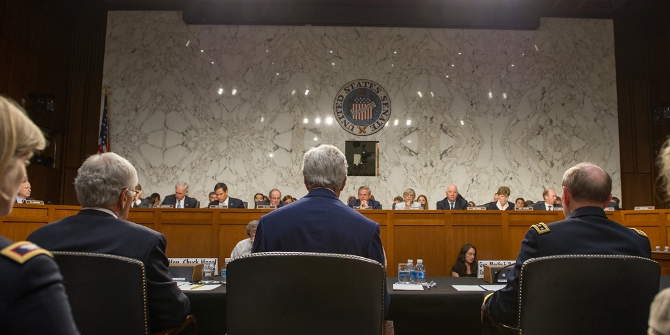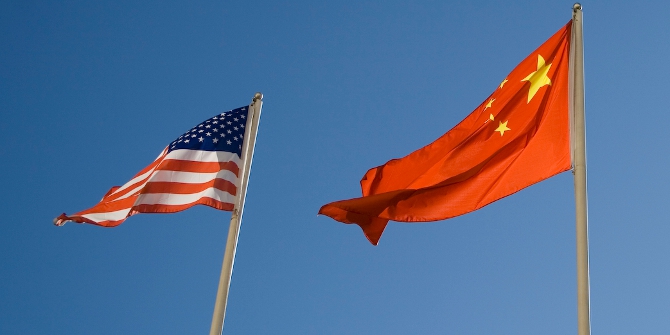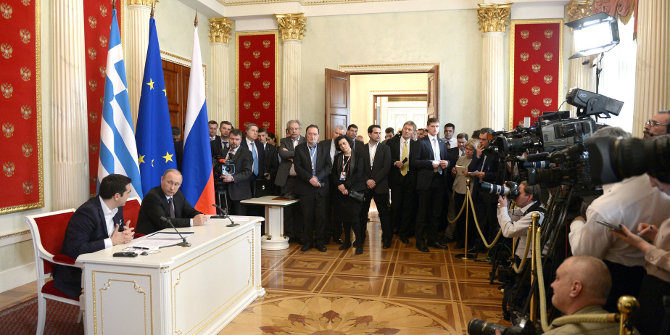 Traditional analysis of U.S. foreign policy towards the Arab-Israeli conflict, and the Middle East in general, is either confined to the limits of local actors in the Middle East, or, when it takes into account domestic actors in the U.S., focuses almost exclusively on the Israeli lobby. Cynthia Salloum argues that foreign policy analysis needs to take more account of the variety of non-state actors and the non-official political scene – among policy stakeholders and within general public opinion – and its future effects on foreign policy making.
Traditional analysis of U.S. foreign policy towards the Arab-Israeli conflict, and the Middle East in general, is either confined to the limits of local actors in the Middle East, or, when it takes into account domestic actors in the U.S., focuses almost exclusively on the Israeli lobby. Cynthia Salloum argues that foreign policy analysis needs to take more account of the variety of non-state actors and the non-official political scene – among policy stakeholders and within general public opinion – and its future effects on foreign policy making.
A large number of “hyphenated-American” populations maintain a strong interest in, and relationship with, conflict settings in which the U.S. is a player. American-Palestinian; Lebanese; Syrian; Egyptian; Jordan; Saudi; Emirati; Qatari; Iranian; Jewish and Israeli, actors, experts or advocates, active in Washington, try to impact the policy marketplace brought about by conflicts in the Middle East.
For an accurate look on the transformation of statecraft and diplomacy, analysis must increase the attention given to diasporas regardless of their own official lobbies. Diasporas as minorities act as domestic players, but through circulation and transnationalism, they bind domestic and foreign affairs together. Their goal is to lever their counterpart’s political interests back home and promote policies given their own standards. Well connected with local actors in the Middle East, well-introduced in Congress and in the Senate, they are – when powerful – either well-versed in targeting key grassroots constituencies or in raising significant funds, commanding substantive trade flows, or both. They mingle with other political entrepreneurs such as professional lobbyists, public relations firms, non-governmental organizations, congressmen and senators, experts, journalists, foreign officers, defence contractors, oil corporations, officers of the Secretary of Defense. Some of them participate in the shaping of American decision-making in terms of trade; energy; defence industry; mediation in conflicts; political support to key-leaders; etc.
Literature on ethnic lobbying in Washington is prolific—when it comes to some of these actors. Close attention is paid to U.S. support for Israel and its role in Israeli-Palestinian peace negotiations, and American alliances in the Middle East are thoroughly examined. But by limiting analysis of the domestic scene to lobby organizations, this analysis creates a lack of symmetry between the attention given to Washington policy stakeholders and that given to the unapparent rest.
Contrasting the Pro-Israel and Pro-Arab lobbies is a necessarily inconsistent approach as far as U.S. mediation in the Arab-Israeli conflict is concerned. That point of view has stirred the pot between supporters of the former and the latter. The multinational character of the so-called Arab lobby does not provide grounds for the rise of any Arab equivalent pro-Israel organizations like the American Israel Public Affairs Committee.

The ‘Arab’ label itself belies the diversity of Arab national entities. The different nature of their regimes – presidential republics, absolute monarchies, constitutional monarchies, Islamic governments, parliamentary democracies, consocial democracies – affects cooperation and coordination between the U.S. and these states and enhances their contradictory interests and tangled politics.
In terms of pro-Palestinian versus pro-Israel lobbies, the comparison is not an equal one. The Pro-Israel lobby has greater weight in part because Jewish-Americans who identify with the State of Israel are numerically superior; more rooted within American elites and power circles and have been organizing for decades. Pro-Palestinian voices in Washington still suffer from a weak constituency, its relative youth, and a lack of financial support.
There is no common ground to compare such formations, especially when only the Washington scene is taken into account. The Washington official and informal scene is most decisive in the short term; the moving national backstage drives change in the long run. Washington relies on grassroots constituencies on which Congressmen and Senators depend as well as on the public opinion affecting the Presidency and its administration.
But it also runs on alliances and competition among government and non-government, local and foreign, actors. In terms of influence, it isn’t only about lobbying practices and capacities. Networks of non-governmental organizations backed by governments have proven to be decisive in developing non-conventional diplomacies, and diasporas invest widely in these networks.
When it comes to decision-making, the American administration relies heavily on its networkof ambassadors and foreign policy officers based in the Middle East. Nevertheless, both their counterparts in Washington and the president’s direct advisorshave to take into account a polarised political scene at home. Since the end of the Cold War – and throughout, the first Gulf War, the phases of the Israeli-Palestinian conflict and its repercussions on Lebanon, both military interventions in Iraq and Afghanistan and the Arab revolutions –, the relationship to the Middle East was translated in the US through various forthright political standpoints.
Some Americans gave full priority to the Israeli-Palestinian conflict committing to one or the other party, some pledged loyalty to the posture of a necessary Arab nationalism, others strove later on for the overthrow of authoritarian regimes, some nurtured the Sunni-Shiia opposition by vilifying one party or the other, or pleaded for the prioritization of the defense of Christianity in the Middle East, or focused on condemning the rise of anti-Arab racism or Islamophobia in the West…and the list goes on.
While these opinions are not always delimited by ethnic groups, their uptake by the general populace is bound up with the ability of various ethnic, religious or national diasporas to advertise their ideas. Opinions are channelled through think tanks, media and press. As Americans, advocates voice statements, testimonies, claims and analysis, feeding nuanced political accounts on U.S. decision-making. Diasporas per se are not determining factors in policy setting but the knowledge they produce significantly shapes political culture.
In this sense, among all diasporas, those related to conflict settings and especially Middle Eastern diasporas, are ideal political containers in terms of engaging public debates regarding foreign policy making. Why? Because the permanency of conflicts, and the successive alternative war-to-peace and truce-to-war dynamics provides them with time and space to build up political speech and action.Also, ethnic, national and religious diasporas present increasing political commitment, as their transnational ties are strong. And transnational ties and activities inflate in times of unrest, conflicts and war.
But competition among advocates of the same ethnic, religious or national diaspora, weakens their action. Local competitive agendas – mirroring the traditional cleavages of countries of origin –generally come before national lobbying efforts, decreasing the “disruptive” capacities of vocal diasporas like the Lebanese or Palestinian for example. Indeed, non-unified diasporic populations fail to goal-set priorities in addressing state actors. They are unavailing in terms of influencing U.S. administration and generally would fail to convince policy makers to directly privilege their interests over others’. But their scattershot activism is nevertheless effective.
Even disparate, remote voices pave their way to decision-makers through informed audiences. Various diasporic advocates learn to show forbearance, seize the attention of political stakeholders and persist alongside their opponents on the battleground of contradictory interests, on the Hill or towards the administration. Their actions increase the nuanced account of Middle-Eastern voices and claims echoing the liberal character of debates in the U.S. These advocates also stir into the American political milieu new features providing American leaders with political intelligence on the Middle East which helps to bypass false assumptions or mythologies about the nature and motivations of Middle Eastern countries and leaders. Civil society organizations (university-based movements, socio-professional advocacy initiatives), private and public foundations, in various American cities, increase their bargaining strategies.
Setting foreign affairs policy in the Middle East, based on mature, energetic and capable decision-making is caught between perennial crises, the challenges of electoral timelines. Humanitarian interventions, special operations, UN peacekeeping mandates, the engagement of national armies on foreign territories and other joint foreign military efforts that can develop, like US Army South missions “Beyond the horizons”, are core issues to central policy decisions.
As long as the Unites States has no clear and effective policy in the Middle East, it will continue to move in a vicious circle: U.S. intervention and mediation in foreign policy will affect its minority populations; their active diasporas will thrive on bargaining in the marketplace of decision-making in order to trump policies unfavourable to the authorities they’re backing; government policy making will therefore be even more constrained, provoking either episodic failures of mediation or more intervention based on residual political manoeuvring.
This article is based on a talk given at the LSE US Foreign Policy Conference held on September 17-19th, 2014. You can watch video highlights from the conference in the player below:
Please read our comments policy before commenting.
Note: This article gives the views of the author, and not the position of USAPP– American Politics and Policy, nor of the London School of Economics.
Shortened URL for this post: http://bit.ly/1KNljcw
_________________________________
 Cynthia Salloum – EHESS/IRSEM
Cynthia Salloum – EHESS/IRSEM
Cynthia Salloum is a political scientist completing her PhD at the political studies department of the École des hautes études en sciences sociales (EHESS). She is currently an affiliate fellow at the Institute for Strategic Research (IRSEM) at the French Ministry of Defense and a visiting PhD Fellow at the European University Institute (SPS, EUI) in Florence. She is active within the CNRS-based Raymond Aron Center for Sociological and Political Research (CESPRA) and teaches at Sciences Po (IEP), in Paris.






